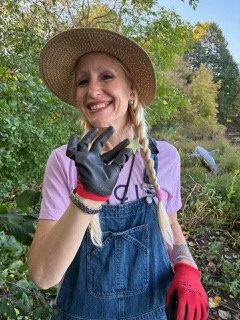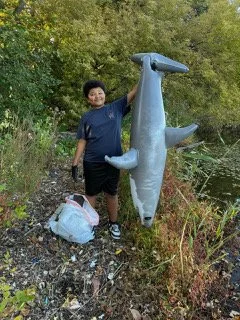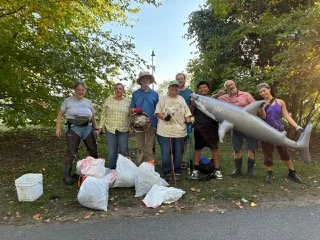By Karen Grossman, Temple Shir Tikvah, Winchester
In addition to throwing sins into a body of water, as is customary for the High Holidays in September, we like to promote a "Reverse Tashlich" where people improve their local watershed by removing trash. Temple Shir Tikvah in Winchester, Temple Shalom of Medford, Beth El Center in Belmont, Community Kahal B’raira in Cambridge and Havurat Shalom in Somerville joined together with the Mystic River Watershed this year for Reverse Tashlich.
One location this year was further away within the watershed at Island End Park in Chelsea. However, 27 hearty souls travelled there with 17 people from Community Kahal B’raira topping the list. In the heat of the day on September 28 we collected 27 bags full of trash and 2 giant styrofoam rolls. Most of this was embedded in the reeds and balanced on the rocky shoreline, remnants left after high tide and apparent partying in the park. A second group of 10 from Havurat Shalom chose to go to Assembly Rowe in Somerville later in the day and collected 8 bags of trash there, including a blown up shark, making the total collected within the watershed at 35 bags+.
Participants, individuals and families, found this Reverse Tashlich satisfying. We learned that having trash barrels in a park is not enough these days to curb water pollution that can be carried out to the ocean. Curbing use of single use plastics and modifying our own habits is key to evoke change.
Photos 1-8: Reverse Tashlich volunteers at Island End Park in Chelsea (Credit: Sushant Bajracharya). Photos 9-11: Reverse Tashlich volunteers at Assembly Row in Somerville (Credit: Havurat Shalom)
Want to learn more about Reverse Tashlich, check out these resources:
Tikkun HaYam-the national organization that launched Reverse Tashlich
Earth Etude for Elul 3: Joining 50 Years of Mystic River Watershed Environmental Advocacy-written by MyRWA volunteer and President of Friends of Spy Pond Park, Karen L. Grossman
What more can you do about trash in our waters?
Keep your yard and local street storm water drain clean of all debris, especially trash. Leaves and dirt are also important to remove from the street storm water drains. These clog the drains and impede drainage. They also contain phosphates from inorganic fertilizers and poisons. Avoiding use of inorganic fertilizers, pesticides, and herbicides also protect our environment from toxins. These toxins are flushed into our waterways via street storm water drains.
Refuse plastics and polystyrene (Styrofoam). Easy first steps include bringing your own reusable shopping bags. Nylon bags fit easily in your life. Usually, a local butcher will wrap meat or fish in wax coated paper and a plastic bag. But, that plastic bag can be used for containing trash properly disposed. Ask for paper containers for left-overs from restaurants. You can bring your own take home containers.
Reduce your waste by changing your habits. There are simple ways and more extensive efforts to create change. Use reusable containers for hot drinks. Use reusable bags for shopping vegetables and fruits. Every reduction makes a difference.
Reuse your “disposables”. Be creative, save money and protect the environment! Purchase second hand items. Share decorations and tools with your neighbors. Bring your own utensils and cups to work for meals.
Recycle and compost properly. Review your city recycling policies. Plastic bags and polystrene (#6 Styrofoam) are not accepted in curbside recycling pickups. Clean white foam can be deposited inside the Save Your Stuff trailer at the City Yard. There are commercial composting companies that service Malden: Bootstrap Compost and Black Earth Compost
Learn more about the zero waste movement and tips at EcoWatch.

















